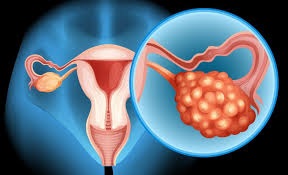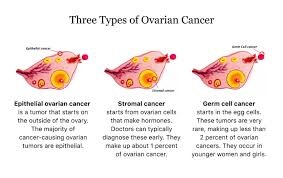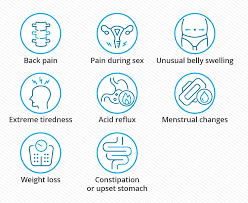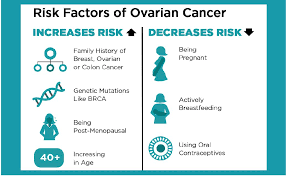UNDERSTANDING OVARIAN CANCER

Ovarian cancer is a serious and often silent disease that affects women’s reproductive health. Understanding its symptoms, causes, and risk factors is crucial for early detection and effective management. In this comprehensive guide, we will define ovarian cancer, explore common symptoms, delve into the causes, and identify key risk factors, including age, family history, and certain medical conditions.
DEFINING OVARIAN CANCER

Ovarian cancer begins in the ovaries, which are the two small organs located on either side of the uterus that produce eggs and hormones. According to the American Cancer Society (2023), ovarian cancer occurs when abnormal cells in the ovaries grow uncontrollably and form tumors. These tumors can be either benign (non-cancerous) or malignant (cancerous). Malignant tumors can invade nearby tissues and spread to other parts of the body.
TYPES OF OVARIAN CANCER

Ovarian cancer is categorized into several types based on the type of cells affected:
- Epithelial Ovarian Cancer: This is the most common type, originating from the outer layer of the ovary. It often spreads to the pelvis and abdomen before being diagnosed.
- Germ Cell Tumors: These tumors develop from the cells that produce eggs. They are less common and usually affect younger women.
- Sex Cord-Stromal Tumours: These tumors arise from the connective tissues of the ovary that produce hormones. They are rare but can cause hormonal imbalances.
COMMON SYMPTOMS OF OVARIAN CANCER

Ovarian cancer often presents with symptoms that can be subtle and easily overlooked. Recognizing these symptoms early can significantly impact the outcome. The following are common symptoms associated with ovarian cancer:
Abdominal or Pelvic Pain:
One of the most frequent symptoms of ovarian cancer is persistent abdominal or pelvic pain. This pain may be described as cramping, aching, or a general discomfort that does not go away. It is essential to differentiate between occasional discomfort and persistent pain, as the latter may indicate a more serious condition.
Bloating:
Bloating, or a feeling of fullness in the abdomen, is another common symptom. Women with ovarian cancer may experience persistent bloating that is different from the occasional bloating caused by dietary factors. This sensation can be accompanied by changes in abdominal shape and size.
Changes in Bowel or Urinary Habits:
Women with ovarian cancer might notice changes in their bowel or urinary habits. This can include frequent or urgent need to urinate, constipation, or diarrhea. These changes are often linked to the tumor’s pressure on the bladder or bowel.
Difficulty Eating or Feeling Full Quickly:
Feeling full quickly after eating only a small amount of food is a symptom that can be associated with ovarian cancer. This may result in unintentional weight loss or a significant decrease in appetite.
Fatigue and Weight Loss:
Fatigue and unexplained weight loss can occur due to the body’s response to cancer. Persistent tiredness that does not improve with rest and significant weight loss without an obvious reason should be evaluated by a healthcare provider.
CAUSES OF OVARIAN CANCER

Understanding the causes of ovarian cancer is crucial for prevention and early detection. While the exact cause remains unclear, several factors are known to increase the risk of developing ovarian cancer.
Genetic Mutations:
Certain genetic mutations are strongly associated with ovarian cancer. Women who inherit mutations in specific genes, such as BRCA1 and BRCA2, are at a higher risk. According to the National Cancer Institute (2021), these genes are involved in repairing damaged DNA, and mutations can lead to an increased likelihood of cancer development. Women with these genetic mutations should consider regular screening and preventive measures.
Hormone Replacement Therapy (HRT):
Hormone replacement therapy, used to alleviate menopausal symptoms, may also increase the risk of ovarian cancer. Estrogen-only HRT, in particular, has been linked to a higher risk of ovarian cancer, although the relationship is complex and varies depending on the duration of use and individual factors.
Endometriosis:
Endometriosis, a condition where tissue similar to the lining of the uterus grows outside the uterus, has been associated with an increased risk of ovarian cancer. Women with endometriosis may have a higher likelihood of developing ovarian cancer, particularly if the condition is severe.
IDENTIFYING RISK FACTORS OF OVARIAN CANCER

Several risk factors contribute to the likelihood of developing ovarian cancer. Understanding these factors can help individuals make informed decisions about their health and take preventive actions.
Age:
Age is a significant risk factor for ovarian cancer. The risk of developing ovarian cancer increases with age, particularly after the age of 50. Most cases are diagnosed in women who are postmenopausal. Therefore, regular monitoring and awareness of symptoms become increasingly important as women age.
Family History:
Family history plays a crucial role in ovarian cancer risk. Women with a family history of ovarian cancer, especially if close relatives such as mothers or sisters have been affected, are at a higher risk. According to the American Cancer Society (2023), having a family history of breast cancer can also be associated with an increased risk of ovarian cancer due to shared genetic factors.
Genetic Conditions:
Certain genetic conditions are linked to an increased risk of ovarian cancer. In addition to BRCA1 and BRCA2 mutations, other genetic syndromes such as Lynch syndrome (associated with colorectal and other cancers) and familial ovarian cancer syndromes can elevate the risk. Genetic counseling and testing can help identify individuals who may be at higher risk due to these conditions.
Reproductive History:
Reproductive history can influence ovarian cancer risk. For instance, women who have never been pregnant or who have had fewer pregnancies may have a slightly higher risk. Conversely, women who have used oral contraceptives for several years have been shown to have a reduced risk of ovarian cancer, possibly due to the hormonal effects of the pills.
Lifestyle Factors:
Certain lifestyle factors may also impact the risk of ovarian cancer. Smoking, while not directly linked to ovarian cancer, can contribute to overall health problems that might affect cancer risk. Maintaining a healthy lifestyle, including regular exercise and a balanced diet, is beneficial for reducing the risk of various types of cancer, including ovarian cancer.
CONCLUSION.
In summary, ovarian cancer is a serious disease that affects the ovaries and can have subtle, often overlooked symptoms. Understanding the symptoms, causes, and risk factors associated with ovarian cancer is crucial for early detection and effective management. Common symptoms include abdominal pain, bloating, changes in bowel or urinary habits, difficulty eating, and fatigue.
While the exact causes of ovarian cancer are not fully understood, genetic mutations, hormone replacement therapy, and endometriosis are known to increase the risk. Risk factors such as age, family history, genetic conditions, reproductive history, and lifestyle choices play significant roles in determining an individual’s likelihood of developing ovarian cancer.
By staying informed and vigilant about these factors, women can take proactive steps to monitor their health and seek medical advice when necessary. For further information and resources, refer to reputable organizations such as the American Cancer Society (2023) and the National Cancer Institute (2021). These resources offer valuable guidance and support for understanding and managing ovarian cancer.
REFERENCES:
American Cancer Society. (2023). Ovarian Cancer. Retrieved from American Cancer Society
National Cancer Institute. (2021). Ovarian Cancer. Retrieved from National Cancer Institute